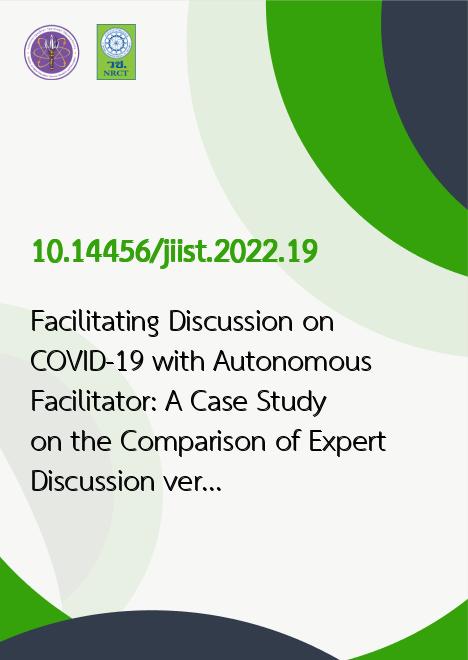
|
Facilitating Discussion on COVID-19 with Autonomous Facilitator: A Case Study on the Comparison of Expert Discussion versus the Public Paradigm Ratio of Reply for Agent Facilitated Post |
|---|---|
| รหัสดีโอไอ | |
| Creator | Jawad Haqbeen |
| Title | Facilitating Discussion on COVID-19 with Autonomous Facilitator: A Case Study on the Comparison of Expert Discussion versus the Public Paradigm Ratio of Reply for Agent Facilitated Post |
| Contributor | Sofia Sahab, Takayuki Ito |
| Publisher | Sirindhorn International Institute of Technology, Bangkadi Campus (SIIT-BKD) |
| Publication Year | 2565 |
| Journal Title | Journal of Intelligent Informatics and Smart Technology |
| Journal Vol. | 8 |
| Page no. | 1-8 |
| Keyword | Conversational agent, Online discussion, Public paradigm, Expert paradigm, COVID-19, Artificial Intelligence, Online forum |
| URL Website | https://ph05.tci-thaijo.org/index.php/JIIST |
| Website title | Journal of Intelligent Informatics and Smart Technology |
| ISSN | 2586-9167 |
| Abstract | An important way to promote large-scale online debate development and improve discussion environment is discussion support platform, with artificial intelligence-based facilitation being its key part. To support such debates, software agents as facilitators need to be developed to facilitate these discussions. In this study, we propose to study this phenomenon using an online-debate system based on facilitation called D-Agree. We aimed to investigate the influence of software entities as autonomous facilitators(AF) on the evaluation of online debate involving cross-class people on COVID-19-related discussion in Afghanistan. This study was conducted with two classes of people:(1) health workers (n= 16) as experts on COVID-19 related debate, and(2) private citizens(n= 16) as public and non-experts on COVID-19-related discussions. Initially the health workers were selected using a non-probability sampling technique of convenience sampling survey in collaboration with Afghanistan national public health institute, and the private citizens were selected using convenience sampling, and then we used stratified random sampling to select 16 people from each class. We created 8 online groups, four for each class namely, A~D, and randomly assigned subjects of each class to a group based on a female and three male members(n= 4; female= 1 and male= 3). The agent will dynamically interact with participants of each group or class of people based on predefined facilitation ratio(1:2= A& C groups; 1:3 B& D groups). For the sake of experimental evolution, we used discussion annotated datasets that contain human and AF posts, and the number of human posts towards AF posts. According to the results, agents with a facilitation threshold of two people(1:2) had a significant impact on discussion development in terms of both discussion elements and posted characters compared with facilitation threshold of 3 people(1:3). With 1:2 setting, we found that the agent improved the responsiveness of both expert class and public class(A&C groups) than 1:3 setting(B&D groups). That means Afghans engage more-write more characters with 1:2 than 1:3 with agent-based facilitation. Hence, the agent increased the number of identified discussion elements. The output of this research can be used as a precondition on setting agent facilitation for least development countries like Afghanistan. |
